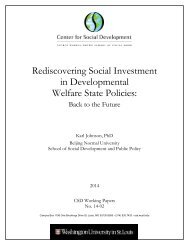Exploring and Assessing Intercultural Competence - Center for ...
Exploring and Assessing Intercultural Competence - Center for ...
Exploring and Assessing Intercultural Competence - Center for ...
You also want an ePaper? Increase the reach of your titles
YUMPU automatically turns print PDFs into web optimized ePapers that Google loves.
<strong>Exploring</strong> <strong>and</strong> <strong>Assessing</strong> <strong>Intercultural</strong> <strong>Competence</strong><br />
Assertion No. 6<br />
Service programs offer unique opportunities <strong>for</strong> sojourners <strong>and</strong> hosts, beyond traditional<br />
educational exchanges<br />
This assertion was not adequately explored in the survey; no specific questions addressed this<br />
area. The implications of the assertion are also not entirely clear. Possibly more on this later.<br />
Assertion No. 7<br />
People are changed (presumably in positive ways) as a result of this experience<br />
Discussion<br />
Responses provided in Part I of the survey provide insights in this regard. For example, the<br />
following are based on comments made by British <strong>and</strong> Swiss alumni:<br />
- absolutely all alumni stated that they had had positive IC experiences<br />
- 16 continued language study (13 in Spanish) upon returning from Ecuador<br />
- 7 pursued a related field of study upon return<br />
- 1 remained in Ecuador to work in another capacity<br />
- 27 (i.e., all but 1) developed new intercultural relationships (friends, colleagues, a<br />
boyfriend, a Colombian spouse, <strong>and</strong> 2 by hosting visitors from abroad<br />
- 10 now work in a related field or in intercultural or multicultural settings<br />
- <strong>and</strong> all cited a variety of ways they continue to utilize their newly developed intercultural<br />
abilities such as a desire <strong>and</strong> interest to learn more about other cultures, respect <strong>for</strong> diverse<br />
perspectives, increased intercultural underst<strong>and</strong>ing, enhanced communication skills, <strong>and</strong><br />
continued use of Spanish<br />
Others commented that they:<br />
- developed an ability to make friends quickly <strong>and</strong> easily<br />
- confidence to go to a country <strong>and</strong> survive<br />
- learned salsa dancing, a great social activity<br />
- realized how privileged they are in the UK<br />
- learned to make the most of every opportunity<br />
- appreciate more what one has, one’s own country<br />
- got to know another part of the world<br />
- can more easily approach people from a different culture<br />
- accept how other cultures function differently<br />
- more open to accept differences (even among the French-Swiss)<br />
- more open to new things<br />
- adapts more easily<br />
- more easy-going (e.g., accepts restructuring at work)<br />
Comments made by volunteers in interviews at the end of their program rein<strong>for</strong>ced many of the<br />
same ideas made by alumni who had already returned home:<br />
(BV6+1)<br />
- experience very enjoyable<br />
- now thinks more about her own culture <strong>and</strong> its components<br />
- knows more about Ecuador <strong>and</strong> South America<br />
<strong>Center</strong> <strong>for</strong> Social Development<br />
Washington University in St. Louis<br />
44
















